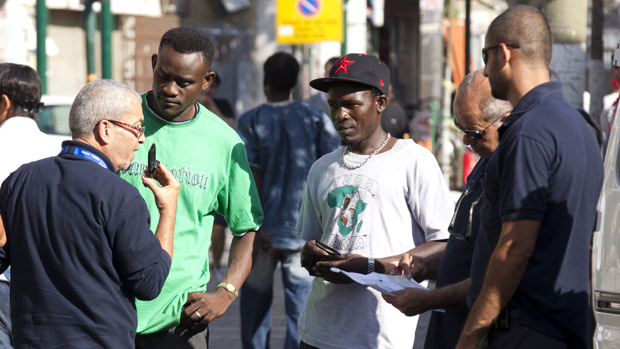Israel accused of 'coercing' African migrants to leave
Refugees from Sudan and Eritrea were pressured to move on, Human Rights Watch says

A free daily email with the biggest news stories of the day – and the best features from TheWeek.com
You are now subscribed
Your newsletter sign-up was successful
Human Rights Watch has accused Israel of breaking the law by forcing thousands of Sudanese and Eritreans migrants to leave the country. It claims that some were detained or tortured after they had been deported.
"The New York-based group said in its report that it had documented seven cases in which citizens of Sudan were detained and interrogated in the capital, Khartoum, on their return," says the New York Times.
"While four of the seven were released after short periods, the report said, one was tortured, a second was put in solitary confinement and a third was charged with treason for visiting Israel."
The Week
Escape your echo chamber. Get the facts behind the news, plus analysis from multiple perspectives.

Sign up for The Week's Free Newsletters
From our morning news briefing to a weekly Good News Newsletter, get the best of The Week delivered directly to your inbox.
From our morning news briefing to a weekly Good News Newsletter, get the best of The Week delivered directly to your inbox.
In response, the Israeli government has said that its policies of migrants and asylum-seekers complied with international laws.
When did the African refugees and asylum seekers arrive in Israel?
Many Sudanese and Eritreans began arriving in Israel via the Egyptian Sinai border in large number in 2006. "By December 2012, about 37,000 Eritreans and 14,000 Sudanese had entered the country", says the BBC.
How many of them remain in Israel?
A free daily email with the biggest news stories of the day – and the best features from TheWeek.com
That remains unclear, but only one Eritrean and two Sudanese applicants were recognised by Israel as refugees. According to the Human Right Watch report, 6,400 Sudanese and 367 Eritreans has officially left Israel by June 2014.
Why are so many African migrants trying to get to Israel?
African migrants in Israel are mostly from war-torn regions such as Eritrea and Darfur. They arrived in Israel after taking a long journey across the Egyptian Sinai, where reports suggest that they face the risk of kidnap and torture.
What is Israel's official policy towards refugees?
Under its Prevention of Infiltration Law, Israel detains asylum seekers without charge and holds them in a camp called Holot in the Negev desert for an unspecified period of time. During that time they do not have access to non-emergency healthcare, work permits or other social services, but they are offered airfare and other stipends if they decide to leave.
What are the allegations in this case?
According to Human Rights Watch, Israel:
- violates international laws relating to the 'non-refoulement' of refugees – ie the convention that they should not be returned to the hands of their persecutors – by "unlawfully coercing" them to go home or to other countries in which they face dangers, such as Uganda, Ethiopia or Rwanda
- does not grant asylum seekers fair and legal asylum procedures.
- pressurises asylum seekers to leave by limiting their access to jobs and healthcare.
What does Israel say in response?
"Israel says its policies on illegal immigrants and refugees comply with international law," the BBC reports. Last year, Israeli Prime Minister Benjamin Netanyahu described asylum-seekers as "illegal infiltrators flooding the country", The Guardian reports, and in July he said that repatriating African asylum seekers is "essential to the welfare of Israel's citizens and for its future as a Jewish and democratic nation", according to Al Jazeera.
-
 How the FCC’s ‘equal time’ rule works
How the FCC’s ‘equal time’ rule worksIn the Spotlight The law is at the heart of the Colbert-CBS conflict
-
 What is the endgame in the DHS shutdown?
What is the endgame in the DHS shutdown?Today’s Big Question Democrats want to rein in ICE’s immigration crackdown
-
 ‘Poor time management isn’t just an inconvenience’
‘Poor time management isn’t just an inconvenience’Instant Opinion Opinion, comment and editorials of the day
-
 Epstein files topple law CEO, roil UK government
Epstein files topple law CEO, roil UK governmentSpeed Read Peter Mandelson, Britain’s former ambassador to the US, is caught up in the scandal
-
 Iran and US prepare to meet after skirmishes
Iran and US prepare to meet after skirmishesSpeed Read The incident comes amid heightened tensions in the Middle East
-
 Israel retrieves final hostage’s body from Gaza
Israel retrieves final hostage’s body from GazaSpeed Read The 24-year-old police officer was killed during the initial Hamas attack
-
 China’s Xi targets top general in growing purge
China’s Xi targets top general in growing purgeSpeed Read Zhang Youxia is being investigated over ‘grave violations’ of the law
-
 Panama and Canada are negotiating over a crucial copper mine
Panama and Canada are negotiating over a crucial copper mineIn the Spotlight Panama is set to make a final decision on the mine this summer
-
 Why Greenland’s natural resources are nearly impossible to mine
Why Greenland’s natural resources are nearly impossible to mineThe Explainer The country’s natural landscape makes the task extremely difficult
-
 Trump, Iran trade threats as protest deaths rise
Trump, Iran trade threats as protest deaths riseSpeed Read The death toll in Iran has surpassed 500
-
 Iran cuts internet as protests escalate
Iran cuts internet as protests escalateSpeed Reada Government buildings across the country have been set on fire